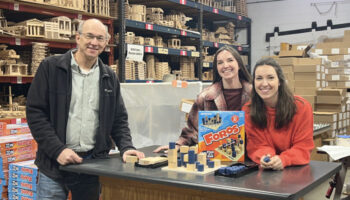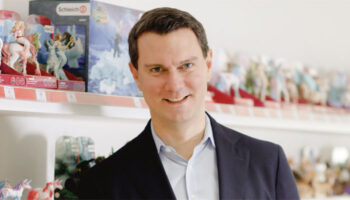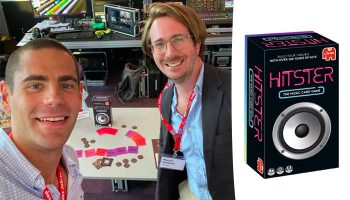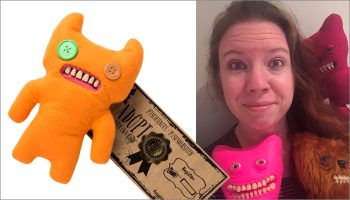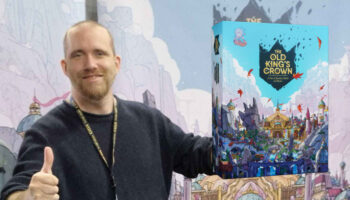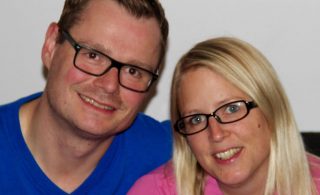Rachele Harmuth – Head of ThinkFun – on how the industry can help build resilience in children through MESH

Rachele, it’s great to connect. To kick us off, how did you find you way into toys?
I went to college for theatre. It was my whole life and I was sure that’s all I was ever going to do. I started as a Directing major, but I got really interested in the costume design and scenic design side of things. So, I switched over to study Costume & Scenic Design, then I hit junior year and the head of the theatre design programme sat me down and said “You need to be a toy designer.”
Wow! How did you react to that?
I remember being like ‘That’s a thing?’ It had never occurred to me. But they told me to meet with this person named Maureen. She had previously gone to my university and then had a career in toy invention, so they thought she’d be a good source of inspiration for me and she was… I met her and she changed my life!
Wow, did you stay in touch?
Well, this is a funny story. I unfortunately didn’t and only could remember her first name. But I had dinner at Nuremberg with Hasbro’s Tanya Thompson and I was telling her this story… She said: “Wow, Maureen ‘who’? Who was it?” and I said “I can only remember that her name was Maureen, she worked at a place called Thin Air and she changed my life.” Tanya then pulled something up on her phone and said: “That’s Maureen Trotto!”
Ha! That’s the power of Tanya Thompson!
Exactly! I was blown away – what a small world toys is! Hopefully I can make that connection and thank her!
From there, I spent every moment I could trying to convince toy people to come and have a coffee with me. I found out about Toy Fair and decided I had to go. I discovered you had to be a company to go to the show, so I incorporated a company and went to Toy Fair!
I booked a hotel room in New York City, I was super excited – it was in the Toy Building back then. I rocked up with my little business card, picked a suite, started looking around and immediately got thrown out…
Oh…
I didn’t know that you couldn’t walk around! I was 20, broke and I’d booked a hotel room – the injustice of it all really hit me! I decided to march back in and try to see whatever I could. I got thrown out of 26 showrooms.
It might be a record – who knows!
Ha! Well, for better or worse, that was my introduction to the toy industry.
And in your career, you’ve been at K’NEX, Klutz, Fat Brain Toys, and now ThinkFun. And you’ve uniquely had roles across design, sales and marketing – did that all contribute to how you work at ThinkFun?
It was always a question of ‘what do I not know yet?’ You could spend a lifetime in design and be learning constantly, but I always wanted to run a company and so I needed to experience all the different moving parts. I also used to run things on the side to achieve similar aims… I wanted to understand retail, so I launched a retail store in the papercraft space. To me, everything comes back to product and that stems from my love of toys.
When we caught up at Nuremberg, you told me about ThinkFun’s exciting MESH initiative. For anyone new to MESH, what do they need to know?
Well, at ThinkFun we had these amazing products but I hadn’t played in this world for a while, so I wanted to get out there and understand what makes us relevant.
STEM and STEAM have been a focus in the industry for the last 10 years, and ThinkFun has been doing STEM before STEM was even a thing! I was talking to retailers about STEM, and they told me that people weren’t really coming into stores looking for STEM products. It wasn’t driving the market. That made us stop and take a breath.
I can imagine! So what did they say was driving things?
We found the main conversations were around mental health challenges. People were really talking about this is relating to kids. The assumption when you talk about this kind of thing is that it’s about teenagers, but research showed us it was about far younger kids as well. For example, in 2022, mental health-related emergency department visits increased 24% for children aged five to 11. Both the American Academy of Pediatrics and the American Academy of Child and Adolescent Psychiatry declared a national state of emergency in children’s mental health back in 2021.
Wow. That’s worrying.
It is. So we started looking at the effects of this on parents and their struggles around supporting their kids. 66% of adults said that parenting was more stressful in 2021 than it was in 2020 – and the world shut down in 2020! 89% of parents currently say that their children’s mental health is more important than their child’s academic achievement. That was driving what retailers were seeing. Parents weren’t coming in looking for toys and games that helped pave the way for academic success; they wanted products that would help their kids feel okay.
We then went to Dr Deborah Gilboa, a resilience expert and family practice doctor, and we asked her to help us understand what’s happening with kids’ mental health and what kids need to be more resilient. She then introduced us to an acronym we fell in love with – MESH.
And MESH stands for…
Mental Emotional Social Health. It is a way to talk about mental health that felt different from the school system and it gave us a handle to explore this.
If you look at what’s sold in the industry around mental health, it’s toys that provide comfort. Weighted plush and fidgets and Squishmallows… You hold them, you touch them and you feel better. Those products are amazing and provide an experience that helps with recovery. They bring you back to your baseline of “okay”, but they don’t build skill that help children’s resilience for the future.

Right. So what does build resilience?
There are eight skills that do exactly that: problem solving, perseverance, adaptation, conflict resolution, self-regulation, self-advocacy, cognitive skills and communication strategies.
And how do they translate into toys and games?
Well, products that focus on problem solving, storytelling and that have increasing challenges all build these skills. As do products that bring children and adults together.
That fits nicely into quite a lot of ThinkFun’s portfolio, especially your level-based puzzles like Rush Hour and Gravity Maze.
Absolutely. The two big things for ThinkFun are ‘The joy of the challenge’ and ‘The power of progression’. There’s a real joy in accomplishing our challenges. And you get better every time you play.
And it’s worth stressing, MESH isn’t replacing STEM. It’s about the industry embracing both.

Makes sense. How can our readers engage with MESH?
We’ve launched a site – www.MESHhelps.org – that has all of the basics in there and also has downloadables for parents and retailers. We’ve also put together a taskforce spanning manufacturers, retailers, social scientists and inventors that are focused on developing the MESH mission.
Speaking of inventors, how should they engage with MESH? Is it something they should be incorporating in their pitches to you?
It’s really about helping inventors understand the impact, power, and importance of what they’re developing. If you can look at what you’re inventing and recognise that it encourages perseverance, that really matters. We don’t really talk about skills like adaptation and conflict resolution in the same way that we discuss academic skills, so it’s about changing that.
We all know play is good, but I couldn’t really tell you how before. MESH gives us a framework to explain why to both retailers and parents. STEM managed to let parents know that kids can learn great things through fun products. That paved the way for us to have this conversation in the context of mental health.
Rachele, this has been great. Before I let you go, two more questions… Firstly, how do you fuel your creativity?
Experience and exposure to art and different cultures helps, but working with my phenomenal team is the big one. As an example, Josh West is the embodiment of ThinkFun and he does a great job of seeing concepts and where concepts could go. The team has a beautiful ability to ask ‘what if’ when reviewing inventor concepts and you can’t help but have ideas and creative conversations in those meetings.
Lovely. And the last one – and I’ve stolen this from my colleague Deej – what’s the most interesting thing on your desk?
I have a sign that says ‘Don’t Grow Up, It’s a Trap’. I also have a Mr T action figure from the Eighties, a unicorn piñata, a plush Venus Flytrap… I’m all about goofy fun!
As we all should be! Huge thanks for this Rachele – let’s tie-in again soon.
–
To stay in the loop with the latest news, interviews and features from the world of toy and game design, sign up to our weekly newsletter here






